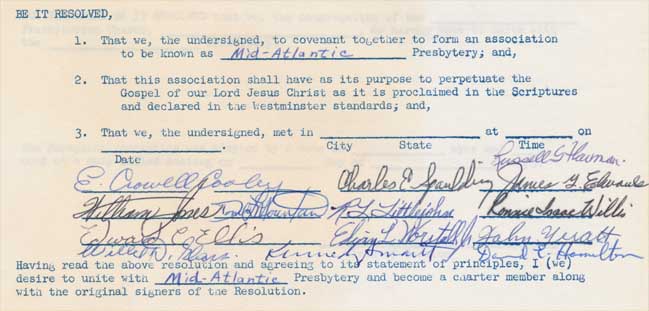In the last years leading up to the formation of the Presbyterian Church in America, preparations were underway on several fronts, laying the groundwork for a new denomination. Providentially, two critical legal cases in the 1960’s had established the property rights of congregations. Then by the early 1970’s, churches that were leaving the PCUS knew that they could not properly leave to independency. Thus the need for a Presbytery structure led to the formation of Vanguard Presbytery. Vanguard began its existence some fifteen months before the organization of the PCA, and continued to serve as a Presbytery of the denomination until 1977, when its churches were received into more geographically proximate PCA Presbyteries.
The PCA’s First Presbytery, Before There Was a PCA.
On September 7, 1972, 16 persons representing 10 churches which had already withdrawn or were planning to sever their connection with the Presbyterian Church U.S. met at Eastern Heights Presbyterian Church in Savannah, Georgia.
In a unanimous vote they adopted this resolution:
WHEREAS, We, the undersigned have met together to study the situation in the Church of Jesus Christ, and
WHEREAS, We are agreed that the Scriptures of the Old and New Testaments are the Word of God, the only infallible rule of faith and practice, and
WHEREAS, We are agreed that the Westminster Confession of Faith and the Larger and Shorter Catechisms set forth the system of Doctrine declared in the Scriptures, and
WHEREAS, The Book of Church Order of the Presbyterian Church in the United States (1934 edition) sets forth a reasonable and practical formulary for church organization, therefore
BE IT RESOLVED,
1. That we the undersigned do covenant together to form an Association to be known as VANGUARD PRESBYTERY, INC., a provisional presbytery for Southern Presbyterian and Reformed Churches uniting, and
2. That this Association shall have as its purpose to perpetuate the Gospel of our Lord Jesus Christ as it was proclaimed in the Southern Presbyterian Church prior to the year 1938.
Read at the meeting was a letter which the Rev. Arnie Maves, a Presbyterian Evangelistic Fellowship evangelist, wrote to the Rev. Todd Allen who convened the meeting:
” … This is to confirm our telephone conversation on Monday evening concerning the upcoming meeting in Savannah, Georgia. I want to say on paper what I said on the phone, that I stand ready and willing to become a part of the Vanguard Presbytery which hopefully will be formed very soon. I want to be counted as one of the charter members of that Presbytery as soon as it is officially formed.
“I am presently a member of Cherokee Presbytery of the P.C.U.S. and have never changed in my beliefs as first stated some years ago upon my ordination. I still believe the Bible to be the Word of God written, the only infallible rule of faith and practice, and I still adhere to the Westminster Confession with the Shorter and Larger Catechisms as the best interpretation of the Scriptures that I know.
“I feel that my denomination has changed and left me. I have not changed my views … nor my vows. Therefore, I can no longer hold to nor adhere to what the PCUS is now doing. I am in disagreement with them in most points … although I love them and do pray for them.
“Therefore, as you gentlemen come to do an historic work … I simply want to say, I am with you … and I want to become a part of this continuing Presbyterian work called Vanguard Presbytery. I don’t know who chose that name . . . but it’s a good one. Praise the Lord.”
Vanguard Presbytery was formally organized at a meeting held in Tabb Street Presbyterian Church, Petersburg, Va., on November 14, 1972. It was reported that their plan was to adopt the Confession of Faith and Book of Church Order which were in effect in 1933 (before the liberals started tampering with them) except for one very significant change, namely that the Book of Church Order would provide explicitly that the local congregation has sole ownership and control of its own property.
The Rev. Todd Allen, who was elected Moderator of Vanguard Presbytery, also served on the Steering Committee for the Continuing Church. Chester B. Hall whose church, First Presbyterian Church of Louisville, Ky., had renounced the jurisdiction of Louisville-Union Presbytery earlier that same year, was elected Clerk and Treasurer.
Words to Live By:
More than anything else, unbelief was the reason these churches left their old denomination. The unbelief of modernism was not necessarily a problem in the pews, but among the prevailing leadership of the old denomination, it was a different story. The crux of the problem was, as the patriarch Abraham said, “There is no fear of God in this place.” (Gen. 20:11). And more than anything else, these churches left to protect and preserve their ability to faithfully preach the Gospel of the Lord Jesus Christ. Their purpose was to remain, as the long-standing motto says, Loyal to the Scriptures; True to the Reformed Faith; Obedient to the Great Commission.
Trivia Question: Who did come up with that name for the Presbytery?

